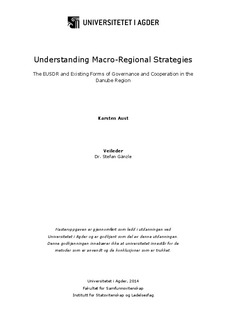| dc.description.abstract | Macro-Regional Strategies (MRSs) revel in noticeable attention in the debate on EU politics. MRSs for the Baltic Sea Region (EUSBSR) and the Danube Region (EUSDR) were launched in 2009 and 2011, respectively. MRSs are anticipated to be a suitable tool to encounter economic, social and environmental challenges within its regions. For Brussels, this new approach represents a more efficient instrument for the utilization of existing resources.
This thesis focuses on the EUSDR by examining its impact on existing modes of governance and cooperation in the Danube Region. Drawing on a multi-level-governance approach, this research is premised on the assumption that the EUSDR will elicit significant mobilization among subnational authorities, non-governmental actors and participating non-EU members. The ambition is to identify the degree of mobilization along the polity, policy, and the politics level of analysis.
The research is divided in two main parts. The first one is descriptive and provides the necessary theoretical, methodological, and contextual background, whereas the second part attempts to determine the degree of mobilization among relevant actors, Additionally, it aspires to identify the mechanisms behind this form of macro- regional cooperation.
The study concludes that the EUSDR has a differentiated impact on existing governance arrangements, varying across actors and policy sectors. The degree of mobilization is rated as moderate, and activities are predominantly present at the policy level of analysis. Based on the empirical observations and the following discussion, it appears reasonable to suggest that the current governance arrangements are favourable for high-performing actors with sufficient resources. Furthermore, the EUSDR clearly entails a top-down character in its governance structure, through which it places the Commission in a position to extend their role from coordinating the strategy to operating it. | nb_NO |
